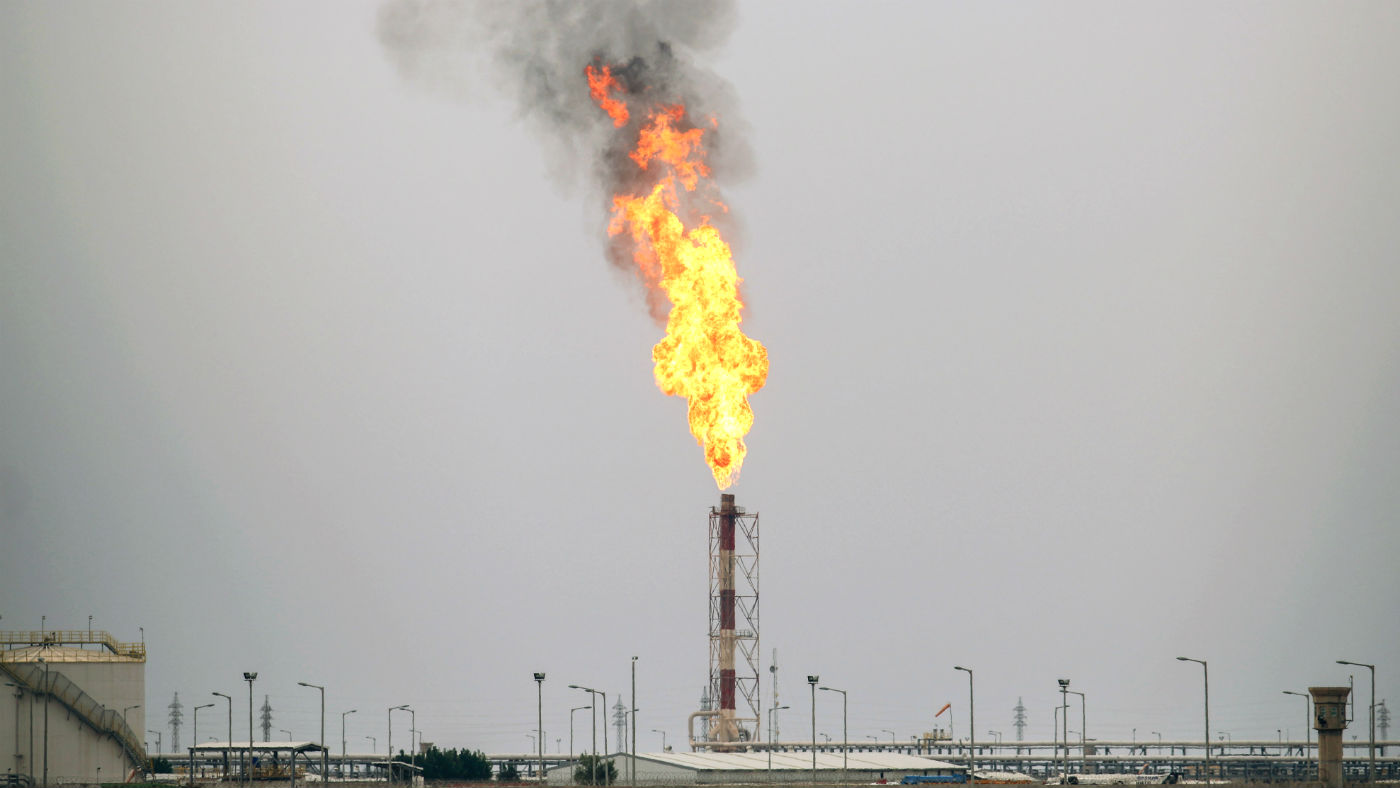Oil price posts two-year highs - but how long can it last?
Brent rose above $59 a barrel this week, its best third-quarter showing since 2004

A free daily email with the biggest news stories of the day – and the best features from TheWeek.com
You are now subscribed
Your newsletter sign-up was successful
14 July
A disappointing draw on raw crude oil reserves and a warning from the international energy watchdog on petrol and diesel stockpiles has dragged the oil price lower again.
International oil price benchmark Brent crude was at around $46.50 a barrel in London this morning, a little more than 50 cents above its two-month low hit last week and well below the $48 a barrel at which it opened yesterday's trading session.
The Week
Escape your echo chamber. Get the facts behind the news, plus analysis from multiple perspectives.

Sign up for The Week's Free Newsletters
From our morning news briefing to a weekly Good News Newsletter, get the best of The Week delivered directly to your inbox.
From our morning news briefing to a weekly Good News Newsletter, get the best of The Week delivered directly to your inbox.
US oil benchmark West Texas Intermediate hovered around $45 a barrel, having been as low as $44.75 overnight.
This came after a spate of reports on oil supply and reserves, including from the US watchdog the Energy Information Administration (EIA) and its global counterpart the International Energy Agency (IEA).
The EIA estimated that domestic raw crude stockpiles declined 2.5 million barrels last week, continuing a two-month trend, reports Reuters.
But the drawdown was lower than the three million barrels predicted by analysts and elsewhere, the watchdog found stocks of distillates, including diesel, and gasoline surged by 4.1 and 1.2 million barrels respectively.
A free daily email with the biggest news stories of the day – and the best features from TheWeek.com
This indicates raw oil is being purchased and processed, but that there is a huge glut of the resulting consumable products, despite the start of US driving season suggesting demand should be high.
In its own report, the IEA warned this poses a "threat to oil price stability", says Oilprice.com, which added that significant rises to the oil price were unlikely and that a fresh "rout" is possible.
The IEA also said "floating storage" - crude oil held offshore in tankers - last month rose to its highest level in seven years. On Tuesday, the American Petroleum Association reported US reserves had risen by 2.2 million barrels.
"[Stocks] are at such elevated levels, especially for products for which demand growth is slackening, that they remain a major dampener on oil prices," the IEA said.
Oil price dips again on surprise inventory surplus
13 July
After a huge surge in New York trading yesterday evening, the oil price was falling on Wednesday morning following reports that US crude inventories recorded a surprise surplus last week.
Weekly data compiled by the American Petroleum Institute showed a 2.2 million barrel build in US reserves last week, Reuters reports.
Brent crude was down 1.8 per cent to around $47.60 a barrel in London this morning. US counterpart West Texas Intermediate was down 1.4 per cent at around $46.
A run of data showing consecutive weekly supply deficits had given hope that the market was moving more sustainably into balance after a two-year supply glut, prompting several rallies that have run out of steam at around $50 a barrel.
Earlier in London trading on Tuesday, Brent was rooted near its two-month low around $46 a barrel, after reports suggested waning demand for oil in the wake of the UK's Brexit vote.
Price rebounded in New York after both the US watchdog, the Energy Information Administration (EIA), and oil cartel Opec forecast demand would be higher than expected next year, after a disappointing end to 2016.
But MarketWatch notes that even with these revised estimates, the EIA still only anticipates Brent averaging $52 next year, only marginally above the level at which it spent most of this spring.
Oil price could drop below $40 as bullish bets slashed
12 July
After falling to another two-month low overnight, the oil price was recovering a little during London trading this morning.
International benchmark Brent crude was around 1.7 per cent higher to $47 a barrel. In New York on Monday, it fell below $46 at one point, its lowest since early May.
This was below the nadir reached last Thursday, in a week that saw an eight per cent overall decline, the worst in six months. Brent had previously been hovering around $50 a barrel.
US benchmark West Texas Intermediate was 1.4 per cent higher this morning to $45.40, after also slumping to a new two-month low yesterday.
Today's upward price move is seen by Reuters as representing a bit of bargain hunting after the sharp falls. Minor loading disruptions in Iraq that could knock 200,000 barrels off its output were also cited.
But this is unlikely to abate renewed fears that the market could return to supply surplus in the coming months, which has prompted investors to slash bullish bets on the near-term oil price.
"We have shifted to a bearish trading stance and off a neutral posture that we had maintained for approximately a month following transition from a bullish view in early June," said Jim Ritterbusch, of Chicago-based oil markets consultancy Ritterbusch & Associates.
"We have suggested the likelihood of a price downdraft in WTI and Brent to about $37 and $38 areas, respectively."
Yesterday's dive was the result of a report suggesting oil orders are falling in Asia, pointing to declining demand in what are among the most important markets, says Reuters.
The Brexit vote in the UK had already triggered a wave of negative forecasts on growth in Europe and beyond, which could hit demand. A rise in the dollar against the pound had also contributed to the bearish view, as it makes oil more expensive.
On the supply side of the equation, recent reports coming out of the US have shown new shale oil drilling wells being added. This has helped to temper positivity from a consistent fall in reserves.
Oil price falls due to economic weakness in Asia
11 July
Oil prices fell this morning amid signs of an economic slowdown in Asia and evidence that US shale producers have now adapted to lower prices.
Traders say the lower prices set in after Asian refiners began cutting crude orders, Reuters reports. The price dip is also blamed on the region's economic slowdown.
"Crude imports to Asia over the last few months are falling ... (but) volumes were so high over the last year thanks to the rush to take advantage of the low oil prices," said Ralph Leszczynski, head of research at the ship broker Banchero Costa. It was therefore natural that a slowdown would take place "sooner than later," he added.
According to Goldman Sachs, "WTI oil [will] remain in a range of $45-50 per barrel over the next 12 months".
There is also mounting evidence that US shale drillers can adapt to prices of $45 or higher, Reuters says. US oil bankruptcies "became sparse in June" and drillers have added rigs "for the fifth week in six."
Saudi Arabia's energy minister Khalid al-Falih said yesterday that prices were beginning to stabilise as oil markets become more balanced.
Oil price heads for biggest weekly fall since January
8 July
Oil's brief recovery was brought to an abrupt halt yesterday, with a rapid slide in New York trading putting it on course for its worst week since January.
A three-day slide had come to an end on Wednesday, after a private sector report estimated a draw on US crude oil stockpiles of 6.7 million barrels last week. International benchmark Brent crude rebounded from below $48 a barrel to above $49.
But the official figures from the Energy Information Administration yesterday showed a much more modest 2.2 million barrel reduction. As a result, Brent slumped five per cent in an hour and ended at a two-month low a little above $46.50 a barrel.
Oil is now headed for a weekly fall of around seven per cent, the deepest since January, says Reuters.
Analysts questioned whether the trader reaction was justified, as crude stocks have still dropped for almost two months straight and US production, now so key to global supply levels, has fallen 12.3 per cent from last year's high.
The scale of the reaction emphasises how skittish traders are in the wake of the UK's vote for Brexit, which could hit demand by hampering global economic growth and through a surge in the dollar against the pound.
Brent recovered a little in mid-morning trading in London today, up 0.6 per cent to $46.68.
"While we are bullish for next year, we continue to be cautious for the rest of this year," Societe Generale oil analyst Michael Wittner said. "For the time being, the path of least resistance for oil prices is lower."
Oil price bounces back on biggest reserves draw in 13 months
07 July
Oil ended its three-day losing streak yesterday after preliminary data pointed to a big draw on US reserves last week.
The American Petroleum Association's weekly report estimated a 6.7 million barrel reduction in domestic stockpiles - the biggest fall in 13 months, says Oilprice.com. The site also reported a drawdown on gasoline and distillates.
Also helping the commodity was a bounce-back for the pound against the dollar, reducing the value of the greenback and making oil cheaper to most global buyers. This is typically seen as positive for demand.
The market has been volatile but caught in a tight range, as statistical signs that it may be in supply deficit after a two-year glut run up against fears that demand will disappoint in the wake of a hit to global growth and the ripple effects of the UK's Brexit vote.
The pound has continued to surge today and was back above $1.30 this morning, having hit a low of $1.28 yesterday. Added to that, official regulatory data could endorse the US supply draw, which might push oil back above $50.
Whether the market can hold this level is a subject of debate among analysts and depends on a number of factors.
"Yesterday's optimism both in the equities and oil markets could evaporate quickly as the negative impact of Brexit will stay with us for the foreseeable future," analysts PVM said in a note, reports Reuters.
-
 The ‘ravenous’ demand for Cornish minerals
The ‘ravenous’ demand for Cornish mineralsUnder the Radar Growing need for critical minerals to power tech has intensified ‘appetite’ for lithium, which could be a ‘huge boon’ for local economy
-
 Why are election experts taking Trump’s midterm threats seriously?
Why are election experts taking Trump’s midterm threats seriously?IN THE SPOTLIGHT As the president muses about polling place deployments and a centralized electoral system aimed at one-party control, lawmakers are taking this administration at its word
-
 ‘Restaurateurs have become millionaires’
‘Restaurateurs have become millionaires’Instant Opinion Opinion, comment and editorials of the day
-
 How might the Israel-Hamas war affect the global economy?
How might the Israel-Hamas war affect the global economy?Today's Big Question Regional escalation could send oil prices and inflation sky-high, sparking a worldwide recession
-
 Recent mega-mergers could signal a turning point for the US oil industry
Recent mega-mergers could signal a turning point for the US oil industryTalking Point Both Chevron and Exxon have recently spent billions to acquire smaller oil companies
-
 Has Saudi Arabia lost control of oil prices?
Has Saudi Arabia lost control of oil prices?Today's Big Question Kingdom goes it alone to cut production, risking tension with US and reigniting cooling inflation in Europe
-
 US angered by Opec+ oil cut
US angered by Opec+ oil cutSpeed Read Energy prices to rise further as producers slash supply by two million barrels a day
-
 Global oil demand forecast lowered for 2020 and 2021
Global oil demand forecast lowered for 2020 and 2021Speed Read IEA report says jet fuel demand remains the major source of weakness
-
 Are US-Iran tensions flaring again?
Are US-Iran tensions flaring again?In Depth Trump threatens military action over Twitter
-
 Can a deal be struck to raise oil prices?
Can a deal be struck to raise oil prices?In Depth Opec+ will convene today over video link in a bid to boost crude
-
 What do negative oil prices mean?
What do negative oil prices mean?In Depth Perfect storm of oversupply and storage shortages sees producers paying to get rid of US crude